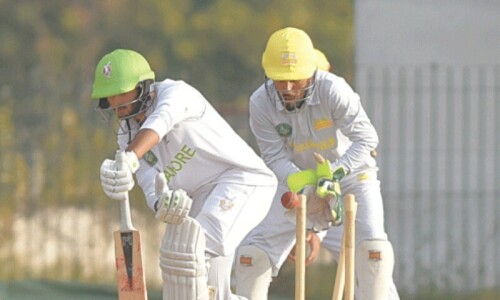HYDERABAD, July 9: Research on Manchhar Lake water shows that the lake water has certain toxicants, particularly some toxic metals and metalloid, at a much higher level than the standards recommended by the World Health Organisation, says research scholar Mohammad Bilal Arain.
Mr Arain said in his presentation for final PhD seminar on “Physico-chemical analysis of Manchhar water, sediment and its effects on fish and residents” on Tuesday that for the past several years, toxic drinking water of Manchhar had been a major source of lethal consequences for the adjoining community as well as for the poisoning of River Indus.
He said that a major disaster caused by Manchhar water was observed during the summer of 2004, when hundreds of people lost their lives and thousands suffered from a variety of epidemics after drinking lake water.
He said that the incident prompted “us to know the ultimate cause of this tragedy and therefore, we, in the labs of National Centre of Excellence in Analytical Chemistry, University of Sindh, designed and launched a project entitled “Physico-chemical analysis of Manchhar Lake water, sediment and its effect on fish sample and residents”.
The scholar said that they found after the research that there were certain toxicants, particularly some toxic metals and metalloid, in the drinking water released from Manchhar at a much higher level than recommended by the WHO.
The toxic metals and metalloid included arsenic, lead, cadmium and nickel, he said and added that new and less time-consuming and cost-effective methodologies were developed to analyse water, sediment, fish, crops and vegetables for their toxicity in the vicinity of Manchhar.
He said that diagnosis of the problem was the first goal which had been achieved in the present study and in future, the main focus would be on the exploration of ways and means to eradicate or decrease the toxicity of polluted drinking water.
He said that already certain projects for providing remedy to the affected community had been designed and placed before the government for funding.
The scholar urged the scientific community to join hands for providing quality water to the people of Pakistan.
Sindh University Vice-Chancellor Dr Mazharul Haq Siddiqui in his presidential address urged scientists and research scholars to focus their research on key problems of the society to reduce the pain they faced in the course of their fight of survival in daily life.















































Dear visitor, the comments section is undergoing an overhaul and will return soon.